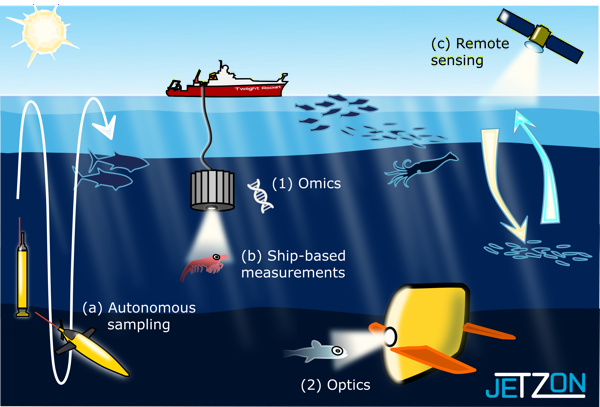About JETZON
Joint Exploration of the Twilight Zone Ocean Network!

State of the art for observing the twilight zone. Methods include (a) autonomous sampling and observing e.g. via floats and gliders, (b) ship-based measurements, and (c) remote sensing. Exciting new insights are being increasingly made through (1) omics and (2) optics (e.g. in situ cameras and backscatter sensors).
Graphic: Sari Giering
The ocean’s Twilight Zone, the dimly led region extending from a few hundred meters depth to 1000 m, is still poorly understood from almost any perspective, whether physics, biochemistry or ecology. However, it contains possibly the world’s largest and least exploited fish stock and is responsible for recycling roughly 80% of the organic material that enters the ocean’s interior from productive surface waters. The former has drawn attention due to increasing demand for resources from a growing world population.There is therefore a pressing need to understand the consequences of perturbing this ecosystem.
JETZON was set up to address the question: how can we as an international scientific community obtain the greatest insight into the Twilight Zone from ongoing work and how can we maintain focus on this potentially threatened environment?
JETZON has to origin in the BIARRITZ (Bridging International Activity and Related Research Into the Twilight Zone) workshop in July 2019, funded by the National Environmental Research Council (UK), NASA, OCB, and SCOR. The workshop brought together 13 international projects tacking aspects of the Twilight Zone’s role and function, from viruses to fish.
Vision
JETZON seeks to provide a forum for all interested in the Twilight Zone, to interact, build collaborations and share data and opportunities.How you can get involved
Most importantly please do. JETZON will only thrive if fuelled by everyone’s interest in this fascinating and important environment. Understanding it is a colossal task but by joining forces we can make real progress. More specifically:
- take a look at our Twitter feed @ocean_Jetzon for recent news. For non-Twitterers it is duplicated on our main page www.jetzon.org.
- check out these Github pages for information on cruises, projects, data and method inter-comparison. If you feel you can contribute something, please do – that’s the beauty of Github. It can be adding something to existing information or something new.
- if you have news that might be of interest to the Twilight Zone community, please tell us. You can email us at jetzon.org@gmail.com or Tweet us @ocean_Jetzon.